Tragic scene on Gough Island as adult albatross killed by mice
First confirmed death of adult Tristan albatross due to mice attack.
News comes as Gough Island Restoration Project progresses aiming to eliminate alien mice from the island.
Report and images from the RSPB
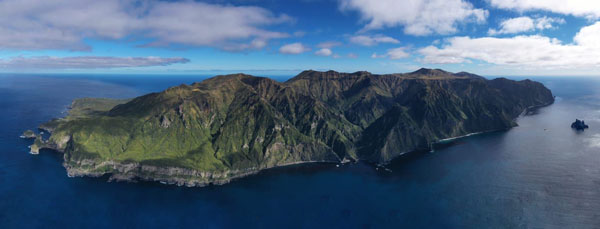
Aerial view of Gough Island (Chris Jones)
- An adult Tristan albatross has been eaten alive by invasive mice, leaving her chick at risk from the mice and starvation. This is the first conclusive evidence that mice kill adults of the species.
- Tristan albatrosses are on the brink of extinction due in large part to invasive mice on their breeding ground, Gough Island.
- The RSPB will begin a mouse eradication project to save the Tristan albatross and other endangered and threatened birds next month.
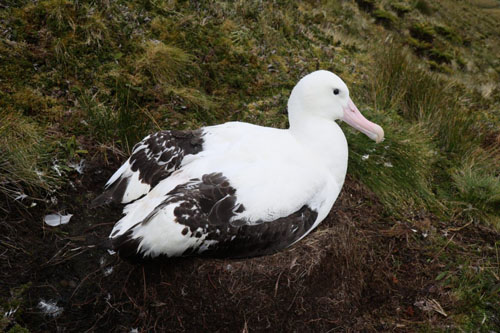
The first-known adult Tristan albatross known to have been killed by house mice (Peter Ryan)
For the first time on record a Critically Endangered Tristan albatross adult has been eaten alive by invasive non-native house mice. About a third of Tristan albatross chicks are eaten by the introduced mice each year on Gough Island, a UK Overseas Territory island and World Heritage Site in the South Atlantic 2,600km away from the nearest land mass of South Africa. Only two to three pairs of Tristan albatross breed anywhere else on Earth. The mouse predation, and the threat of unsafe fishing practices, has placed them in danger of extinction.
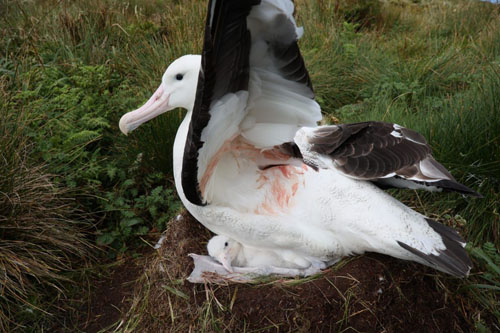
Despite her deep wounds the female adult still guards its chick (Peter Ryan)
This adult was on Gough Island, Tristan albatrosses’ main breeding ground and one of the most remote islands in the world, raising a chick with her mate. She was one of the most experienced mothers on the island and the father must now struggle to feed the chick alone - leaving it at risk not only of starvation but also at greater risk of being eaten by the mice.
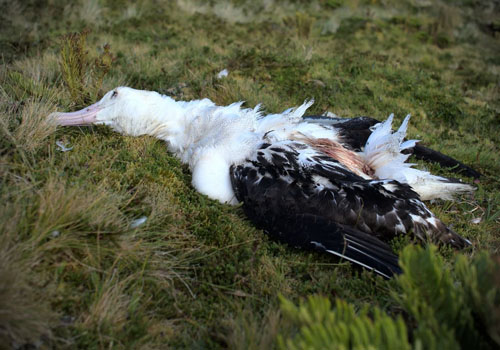
The female's body was later found a little way from the nest (Roelf Daling)
Kim Stevens, RSPB Senior Field Assistant, said: "To see a parent killed in this way, and her chick in such danger, is devastating. Albatrosses are stunning, long-lived birds that spend much of their lives soaring over the oceans, and they need safe places to feed and raise their young. This albatross was ringed when she herself was a chick back in 1986 so we have lost one of our oldest known, most experienced mothers."
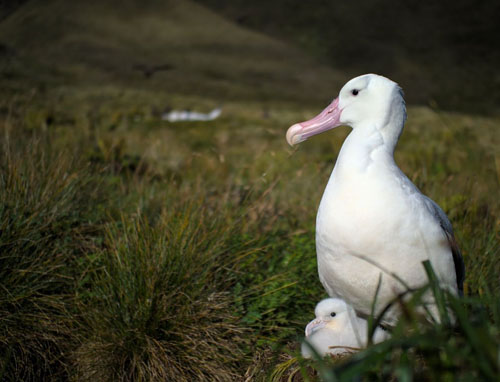
The male parent takes over duties at the nest with the blurred white image of the carcass of its female partrner being consumed by Tristan skuas in the background (Roelf Daling)
Will the chick survive now that only one parent lives?
The death of each breeding Tristan albatross is a devastating loss because they don’t start breeding until they’re about ten years old. It then takes two parents about a year to raise one chick. With only one parent providing food it might take the chick months longer to fledge and is likely to leave it in a weaker state, multiplying the threat from the mice and making it less likely to survive at sea.
It is most likely that sailors in the 19th century accidentally introduced mice to Gough Island. The mice have since adapted to feed on the seabirds, who evolved without the threat of land mammals and so don’t have any natural defences against them. We now know that even the adult Tristan albatross, one of the largest seabirds in the world with a wingspan of over 10 feet, will sit there defenceless as it’s slowly eaten alive. The mice threaten the future of the estimated eight million breeding birds who live on Gough.
This year the RSPB is launching a mission to eradicate every single mouse on the island and make it a seabird paradise once again. The project was originally scheduled to go ahead in 2020, but the coronavirus outbreak meant the RSPB and the Tristan da Cunha government had to abandon these ambitious plans and airlift the team home. With the delays the project now has a significant funding deficit.
Defra Minister for Biosecurity Lord Gardiner said: "The UK is a proud custodian of 14 Overseas Territories which hold over 90% of the UK’s wildlife, and it is our responsibility to rise to the challenge of protecting the species within our care.
"The sad news that we have now lost an adult albatross for the first time is a timely reminder of the global threat of invasive non-native species to wildlife, which is why it is so important that the Government is contributing towards this ambitious project led by the RSPB to save one of the world’s greatest seabird colonies."
People can donate directly to the restoration project to save the Tristan albatross and the other birds on Gough Island at https://www.rspb.org.uk/join-and-donate/donate/appeals/gough-island/.
